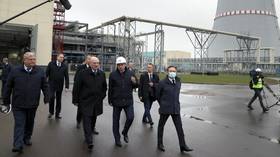Ukraine appeals to Belarus for emergency electricity, as Lithuania admits it still imports energy from embargoed nuclear reactor

A Belarusian power station, once dubbed ‘Chernobyl II’ due to reported safety concerns, is set to do a roaring trade on the European energy market as neighboring countries increasingly find themselves in need of cheap energy.
Lithuania’s minister for energy, Dainius Kreivys, told local media on Thursday that, despite efforts to cut the controversial plant out of its grid, the country was still importing significant amounts of its energy.
According to the politician, around 77 million kWh of electricity has been flowing into the Baltic nation at a cost of €4 million ($4.8 million) since the plant began production. At that rate, Vilnius will be liable to pay Minsk €120 million (almost $145 million) over the course of a year.
Later on Thursday, however, the Belarus Ministry of Energy denied that Lithuania was getting energy from the embargoed power station, in comments on their Telegram channel. The reports by lawmakers in Vilnius, they said, “do not correspond to reality.”
Officials in Minsk pointed to the website of Lithuania’s national grid operator Litgrid, which clearly shows that energy imports from Belarus are “equal to zero, in accordance with the decisions made in Lithuania to stop buying Belarusian electricity.”
Also on rt.com Amid fears of second Chernobyl, Lithuania launches campaign to block energy exports from new Belarusian nuclear plantIn January, Lithuania launched a bid to block currents generated at the Astravyets Nuclear Power Station, as Kreivys emphasized “the need to work toward a complete blockade of [the plant], and to enhance our energy independence and electricity network security.”
The reactor, built as a joint project with the Russian state nuclear energy company, Rosatom Corp., came online in November despite neighboring governments’ strong objections and fears about safety. Astravyets is located less than 60 kilometers from Vilnius, and the Lithuanian government immediately moved to ban Belarusian power in response to the start of its operations.
Before Astravyets was built, Belarus’ power plants were almost meeting domestic energy demands and the country had little need to import electricity. As a result, analysts viewed the plant’s construction as an attempt to position the country in the export market, with plans to sell power to Lithuania, Latvia and Poland.
However, Warsaw has since backed Vilnius by saying it does not wish to buy from Belarus. While Russia would be a viable destination for its exports, there is little demand for energy across Belarus’ eastern border.
Ukraine, however, has emerged as a surprise potential customer for Belarus’ burgeoning power grid. On Thursday, authorities in Kiev reached out to their counterparts in Minsk to request emergency supplies of 500 megawatts. The request follows an accident affecting two thermal power plants that has slashed domestic power production and left homes and businesses in the center of the country at risk of brownouts.
The request comes despite Ukraine’s strong condemnations of embattled Belarusian leader Alexander Lukashenko after months of brutal crackdowns on protesters. The country has seen thousands take to the streets since last August, after the veteran president declared victory in a nationwide election. Opposition groups, and many international observers, say that the results were rigged and demonstrators have been calling for a fresh poll to be held.
If you like this story, share it with a friend!














